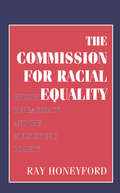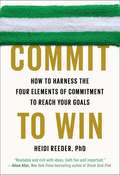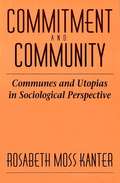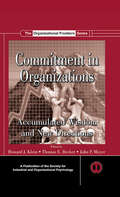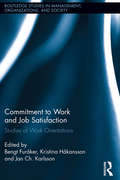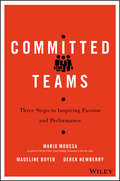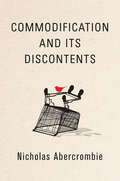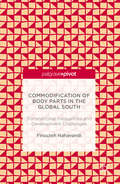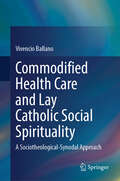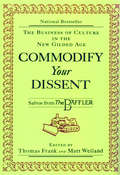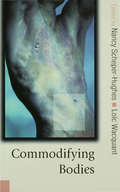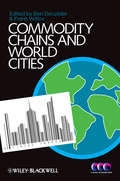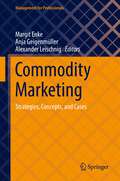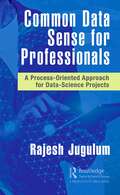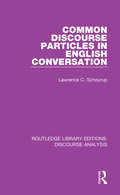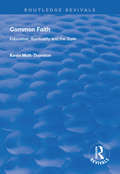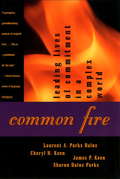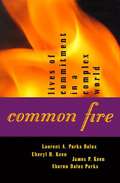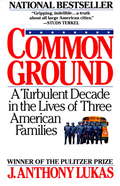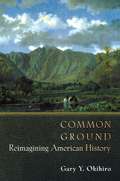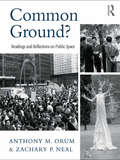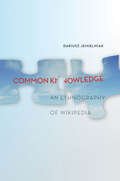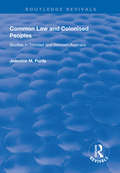- Table View
- List View
Commission for Racial Equality: British Bureaucracy and the Multiethnic Society
by Ray HoneyfordIn the United Kingdom, as in the United States, race relations are surrounded with taboos defined by the politically correct concepts of what Ray Honeyford calls the race relations lobby. This lobby, championed by the Commission for Racial Equality (CRE) has a vested interest in depicting the United Kingdom as a society rotten with endemic racism, and its ethnic minorities as victims doomed to failure. An outgrowth of the Race Relations Act of 1976, the Commission was founded in response to worthy concerns about race and patterned after its American prototype, the Congress of Racial Equality. Its constant demands for increased powers have only increased with the coming into power of the New Labour Party. That makes Ray Honeyford's critique all the more urgent. Honeyford exposes the policies and practices of the Commission to public view, encouraging informed debate about its need to exist. The CRE possesses considerable legal powers—powers which seriously undermine the great freedoms of association, contract, and speech as-sociated with the United Kingdom. Without denying the presence of racial prejudice, Honeyford shows that the picture of the United Kingdom as a divisive nation is a serious misrepresentation.Placing the CRE in its historical and political context, Honeyford outlines its powers, and analyzes its formal investigations in the fields of education, employment, and housing. He also examines its publicity machine and its effect on public and educational libraries. He points out the danger of uncritically replicating the American experience. According to Honeyford, Americans have replaced a melting-pot notion of society, with all citizens loyal to a national ideal, with a "tossed-salad" concept which encourages the creation of self-conscious, separate, and aggressive ethnic groups, each claiming special access to the public purse, and having little regard for national cohesion and individual liberties.
Commit to Win
by Heidi ReederWhat do you need besides motivation and willpower? In Commit to Win, Heidi Reeder, PhD, unpacks over forty years of research by psychologists and economists to show that the key to reaching any goal, whether it's to hit the gym more often or to finally quit that dead-end job, isn't motivation, willpower, or determination. It's commitment. Busting the myths most of us believe about commitment, Reeder shows that it all comes down to four variables: Treasures: the benefits we get from working toward a goal, Troubles: the difficulties we have to deal with, Contributions: the time, money, and effort we invest, and Choices: the number of good alternatives we have. Together, these variables make up a formula that not only measures how committed we are, but also shows which factors we can change to get our commitment level in sync with what we want to do. Packed with practical examples and action plans for a variety of situations, Commit to Win will allow readers to stop wishing for things to be different and instead make practical changes that will naturally empower them to reach their goals. It will appeal to readers of Succeed and The Willpower Instinct.
Commitment and Community: Communes and Utopias in Sociological Perspective
by Rosabeth Moss KanterWhat makes some communes work, while others fail? Why is it so difficult to put utopian ideals into practice? Rosabeth Kanter offers a unique analysis of the nature and process of enduring commitment, basing her theory of commitment mechanisms on exhaustive research of nineteenth-century utopias, sharpened by first-hand knowledge of a variety of contemporary groups. The book moves in a lively fashion from Oneida, Brook Farm, and the Shakers to present-day phenomena such as rural communes and Synanon.
Commitment in Organizations: Accumulated Wisdom and New Directions (SIOP Organizational Frontiers Series)
by New Directions Accumulated WisdomCommitment is one of the most researched concepts in organizational behavior. This edited book in the SIOP Organizational Frontiers series, with contributions from many scholars, attempts to summarize current research and suggests new directions for studies on commitment in organizations. Commitment is linked to other concepts ie. satisfaction, involvement, motivation, and identification and is studied across cultural lines. Both the individual and group levels of building and maintaining commitment are discussed.
Commitment to Work and Job Satisfaction: Studies of Work Orientations (Routledge Studies in Management, Organizations and Society)
by Jan Ch. Karlsson Bengt Furåker Kristina HåkanssonPeople’s work orientations and attitudes to paid work are highly important for the welfare of any country. Still, little is currently known about how such attitudes are distributed among different countries, men and women, classes, occupations, age groups and so on. Even less is known about how work orientations have changed during the dramatic social transformations of economies and labour markets during recent decades. What happened, for example, to work orientations in Iceland when the country went bankrupt? The answer is quite surprising. Or, is it true that work is losing its position in people’s lives in Western world? What is the relationship between people’s attitudes to work and the way they actually behave on the labour market? This timely book deals with these questions – and more – presenting fresh knowledge on changes in work orientations in many countries. It is based on genuine theoretical arguments and thorough empirical studies, using both qualitative and quantitative methods. It is a great source of new knowledge on work orientations and changes in attitudes to work.
Committed Teams
by Mario Moussa Derek Newberry Madeline BoyerBuild high-performing teams with an evidence-based framework that delivers results Committed is a practical handbook for building great teams. Based on research from Wharton's Executive Development Program (EDP), this concise guide identifies the common challenges that arise when people work together as a group and provides key guidance on breaking through the barriers to peak performance. Committed draws its insights from the EDP's living lab: an intensive two-week simulation during which executive-level participants run complex global businesses. The authors have observed over 100 teams collaborating and competing for over 100 combined years in this intense environment. It has yielded fundamental insights about teamwork: what usually goes wrong, what frequently goes right, and the methods and techniques that will help you access your team's full potential. These insights have been distilled into a simple, repeatable process that you can start applying today. Getting teams engaged and aligned is hard. Committed will give you the tools you need to deal with all of the familiar teamwork challenges that get in the way: organizational politics, delegation, coordination, and aligning skills and motivation. Using vivid stories and examples from the worlds of business, sports, and non-profits, it will teach you how to: Understand the dynamics of successful teams Achieve peak performance using a research-backed methodology Gain expert insight into why most teams underperform Learn the critical points common to all great teams Committed gives you the perspective you need to combine the right people with the right way of collaborating to achieve extraordinary results.
Commodification and Its Discontents
by Nicholas AbercrombieShould human organs be bought and sold? Is it right that richer people should be able to pay poorer people to wait in a queue for them? Should objects in museums ever be sold? The assumption underlying such questions is that there are things that should not be bought and sold because it would give them a financial value that would replace some other, and dearly held, human value. Those who ask questions of this kind often fear that the replacement of human by money values – a process of commodification – is sweeping all before it. However, as Nicholas Abercrombie argues, commodification can be, and has been, resisted by the development of a moral climate that defines certain things as outside a market. That resistance, however, is never complete because the two regimes of value – human and money – are both necessary for the sustainability of society. His analysis of these processes offers a thought-provoking read that will appeal to students and scholars interested in market capitalism and culture.
Commodification of Body Parts in the Global South: Transnational Inequalities and Development Challenges
by Firouzeh NahavandiThisbook proposes the introduction of a development-related perspective toscholarly critique of the human body's commodification. Nahavandi contends that the commodification of humanbody parts reflects a modern form of such well-known historical phenomena asslavery and colonization, and can be considered a new and additional form ofappropriation and extraction of resources from the Global South. Whatare the commonalities between hairtrade, surrogacy, kidney sale and attraction of brains? The author argues that these allcharacterize a world where increasingly everything can be traded or is consideredto be tradeable. A world where, similar to any other goods, body parts haveentered the global market either legally or illegally. Through a series ofmultidisciplinary comparative studies, the book explores how formscommodification of the human body are fuelled by issues of poverty in theGlobal South, and inequality in transnational relations.
Commodified Bodies: Organ Transplantation and the Organ Trade (Routledge Studies in Science, Technology and Society #24)
by Oliver DeckerCommodified Bodies examines the social practice of organ transplantation and trafficking and scrutinises the increasingly neoliberal tendencies in the medical system. It analyses phenomena such as the denomination of human body parts as "raw materials" and "commodities," or the arguments used by the proponents for a free market solution. Moreover, it argues that modern medicine is still linked with its religious roots. The commodification of body parts is seen not as an imperialistic act of the market, but as the end of a historical process as the notion of "fetishism" links the market with the body. Marx’s concept of commodity fetishism and Sigmund Freud’s theory of the perverted use of objects are modified and adapted to the reconstruction of the joint beginnings of market and medicine.
Commodified Health Care and Lay Catholic Social Spirituality: A Sociotheological-Synodal Approach
by Vivencio BallanoThis book establishes a lay social spirituality for health care practitioners that pursues the Catholic Church&’s social teachings on the preferential option for the poor, structural sin, and health care reform to address today&’s commodification of the health care system where maximizing profit and patient&’s capacity to pay become the primary consideration. Applying a sociotheological approach that combines the perspectives of modern sociology, Catholic social doctrines, and Pope Francis's inductive synodal theology, as well as drawing from secondary literature, media reports, and church documents, it argues for the necessity of a holistic, interdisciplinary, and synodal lay Catholic social spirituality that is informed by Pope Francis&’s synodality. Presenting sociological research for health care practitioners to uphold options for the poor in public health, it envisions a lay spirituality that participates in civil society&’s health care reform agenda at the macro level, and practices Christian and Ignatian discernment at the micro level, as its main behavioral components. This book appeals to Christian health care actors, entrepreneurs, and spiritual directors as well as scholars and students in sociology, religion, moral theology, bioethics, and spirituality.
Commodify Your Dissent: Salvos from The Baffler
by Thomas Frank Matt WeilandFrom the pages of The Baffler, the most vital and perceptive new magazine of the nineties, sharp, satirical broadsides against the Culture Trust. In the "old" Gilded Age, the barons of business accumulated vast wealth and influence from their railroads, steel mills, and banks. But today it is culture that stands at the heart of the American enterprise, mass entertainment the economic dynamo that brings the public into the consuming fold and consolidates the power of business over the American mind. For a decade The Baffler has been the invigorating voice of dissent against these developments, in the grand tradition of the muckrakers and The American Mercury. This collection gathers the best of its writing to explore such peculiar developments as the birth of the rebel hero as consumer in the pages of Wired and Details; the ever-accelerating race to market youth culture; the rise of new business gurus like Tom Peters and the fad for Hobbesian corporate "reengineering"; and the encroachment of advertising and commercial enterprise into every last nook and cranny of American life. With its liberating attitude and cant-free intelligence, this book is a powerful polemic against the designs of the culture business on us all.
Commodifying Bodies (Published in association with Theory, Culture & Society)
by Loic Wacquant Nancy Scheper-HughesIncreasingly the body is a possession that does not belong to us. It is bought and sold, bartered and stolen, marketed wholesale or in parts. The professions - especially reproductive medicine, transplant surgery, and bioethics but also journalism and other cultural specialists - have been pliant partners in this accelerating commodification of live and dead human organisms. Under the guise of healing or research, they have contributed to a new 'ethic of parts' for which the divisible body is severed from the self, torn from the social fabric, and thrust into commercial transactions -- as organs, secretions, reproductive capacities, and tissues -- responding to the dictates of an incipiently global marketplace. Breaking with established approaches which prioritize the body as 'text', the chapters in this book examine not only images of the body-turned-merchandise but actually existing organisms considered at once as material entities, semi-magical tokens, symbolic vectors and founts of lived experience. The topics covered range from the cultural disposal and media treatment of corpses, the biopolitics of cells, sperm banks and eugenics, to the international trafficking of kidneys, the development of 'transplant tourism', to the idioms of corporeal exploitation among prizefighters as a limiting case of fleshly commodity. This insightful and arresting volume combines perspectives from anthropology, law, medicine, and sociology to offer compelling analyses of the concrete ways in which the body is made into a commodity and how its marketization in turn remakes social relations and cultural meanings.
Commodity Chains and World Cities
by Ben Derudder Frank WitloxTransnational spatial relations offer a key point from which to study the geographies of contemporary globalization. This book assesses the possible cross-fertilization between two of the most notable analytical frameworks - the world city network framework and the global commodity chain framework. Transnational spatial relations have become a key analytical lens through which to study the geographies of contemporary globalization Brings together contributions of key researchers from different backgrounds and different parts of the world Offers a set of original approaches to the study of the networked geography of globalization
Commodity Marketing: Strategies, Concepts, and Cases (Management for Professionals)
by Margit Enke Anja Geigenmüller Alexander LeischnigCommoditization is a major challenge for companies in a wide range of industries, and commodity marketing has become a priority for many top managers. This book tackles the key issues associated with the marketing of commodities and the processes of commoditization and de-commoditization. It summarizes the state of the art on commodity marketing, providing an overview of current debates. It also offers managerial insights, case studies, and guidance to help manage and market commodity goods and services.
Common Data Sense for Professionals: A Process-Oriented Approach for Data-Science Projects
by Rajesh JugulumData is an intrinsic part of our daily lives. Everything we do is a data point. Many of these data points are recorded with the intent to help us lead more efficient lives. We have apps that track our workouts, sleep, food intake, and personal finance. We use the data to make changes to our lives based on goals we have set for ourselves. Businesses use vast collections of data to determine strategy and marketing. Data scientists take data, analyze it, and create models to help solve problems. You may have heard of companies having data management teams or chief information officers (CIOs) or chief data officers (CDOs), etc. They are all people who work with data, but their function is more related to vetting data and preparing it for use by data scientists. The jump from personal data usage for self-betterment to mass data analysis for business process improvement often feels bigger to us than it is. In turn, we often think big data analysis requires tools held only by advanced degree holders. Although advanced degrees are certainly valuable, this book illustrates how it is not a requirement to adequately run a data science project. Because we are all already data users, with some simple strategies and exposure to basic analytical software programs, anyone who has the proper tools and determination can solve data science problems. The process presented in this book will help empower individuals to work on and solve data-related challenges. The goal of this book is to provide a step-by-step guide to the data science process so that you can feel confident in leading your own data science project. To aid with clarity and understanding, the author presents a fictional restaurant chain to use as a case study, illustrating how the various topics discussed can be applied. Essentially, this book helps traditional businesspeople solve data-related problems on their own without any hesitation or fear. The powerful methods are presented in the form of conversations, examples, and case studies. The conversational style is engaging and provides clarity.
Common Differences: Conflicts in Black and White Feminist Perspectives
by Jill Lewis Gloria JosephCOMMON DIFFERENCES is an unprecedented and unparalleled examination and analysis of an alarming schism in the women's movement: the differences between Black and White women's perspectives, attitudes and concerns on key issues. Written from a political perspective that considers sexism, racism, and classism as the major components affecting the attitudes held by Black and White women today, this book presents an overview of women's status through history and discusses the vital issues where common differences occur: sexuality, men and marriage, mothers and daughters, media images, and the direction of the movement itself. The nature of the schism between Black and White women is brought into sharp focus by a brilliant selection of interviews with a spectrum of women -- the rich, the poor and the so-called middle class, the educated and the illiterate, the domestic and the prostitute, professional women and welfare mothers, lesbians and debutantes, radicals and conservatives, and the elderly and the youthful, all make important contributions in explaining their different consciousnesses and needs.
Common Discourse Particles in English Conversation (RLE: Discourse Analysis)
by Lawrence C. SchourupFirst published in 1985, this book studies several common items in English conversation known variously as ‘discourse particles’, ‘interjections’, ‘discourse markers’, and, more informally, ‘hesitations’ or ‘fillers’. While the analysis primarily focuses on ‘like’, ‘well’ and ‘you know’, the larger concern is the entire set of items of which these are members and as such ‘I mean’, ‘now’, ‘oh’, ‘hey’, and ‘aha’ are also examined. These discourse particles are analysed at length and then a framework is proposed in which their use individually makes sense and allows revealing comparisons to be made between them. This book will be of interest to students of linguistics
Common Faith: Education, Spirituality and the State (Routledge Revivals)
by Kevin Mott-ThorntonPublished in 1998, this book provides a much needed philosophical analysis of the political and educational issues that are raised when spiritual development is regarded as a central educational aim. The author examines the meaning of spirituality in the educational context and provides a suitable educational characterization following a detailed critique of certain ideas put forward by John Dewey, Alistair MacIntyre and Charles Taylor. In the second part of the book the author examines various attempts to derive policies concerning the personal education of pupils from cultural and political claims. The educational implications of a wide range of political perspectives are explored, including those of liberalism, communitarianism, conservatizm and pluralism. Particular attention is given to the constraints imposed on educationalists by the liberalisms of John Rawls and Joseph Raz and, in the final part, the author questions whether any nationally common conception of spiritual education is either educationally adequate or politically acceptable.
Common Fire
by Laurent A. Parks Daloz Cheryl H. Keen James P. Keen Sharon Daloz ParksA landmark study that reveals how we become committed to the common good and sustain such commitments in a changing world. View the discussion guide for UU communities: HTML or PDF "A perceptive, groundbreaking analysis of inspired lives. . . . This is a guidebook for the soul. " --Daniel Goleman, author of Emotional Intelligence "A truly refreshing book! In a day when the political and spiritual air has grown stale with cynicism, discouragement, and indirection, this beautifully written, penetrating study could not be more welcome or valuable. No teacher, parent, or civic leader who cares about nurturing social commitment can fail to be informed and inspired by this remarkable and surprisingly practical book. " --Robert Kegan, author of In Over Our Heads "Eloquent and profound, Common Fire addresses what Americans everywhere long for: a sense of the common good, an emphasis on community and compassion in everyday life, a values-based politics in the public sphere. A compelling, encouraging work. " --Jim Wallis, author of The Soul of Politics "A profound exposition and penetrating commentary on some of life's most important issues. " --Clarence G. Newsome, dean, Howard Divinity School "A compelling portrait of people who choose to make a difference and thus inspire us all. " --Rosabeth Moss Kanter, author of World Class: Thriving Locally in the Global Economy
Common Fire: Leading Lives of Commitment in a Complex World
by Laurent A. Parks Daloz Cheryl H. Keen James P. Keen Sharon Daloz ParksThis book answers the question of how all of us can encourage commitment to society as a whole, both in the next generation and in ourselves by looking at more than one hundred people in many walks of life who live and work on behalf of the common good.
Common Ground: A Turbulent Decade in the Lives of Three American Families
by J. Anthony LukasTwo working-class families and a middle-class family in Boston are portrayed, starting with Martin Luther King Jr's assassination.<P><P> Winner of the Pulitzer Prize.<P> Winner of the National Book Award
Common Ground: Reimagining American History
by Gary Y. OkihiroOkihiro not only exposes the artifice of these binaries but also offers a less rigid and more embracing set of stories on which to ground a national history. Influenced by European hierarchical thinking in the late nineteenth and early twentieth centuries, Anglo Americans increasingly categorized other newcomers to the United States.
Common Ground?: Readings and Reflections on Public Space
by Anthony M. Orum Zachary P. NealPublic spaces have long been the focus of urban social activity, but investigations of how public space works often adopt only one of several possible perspectives, which restricts the questions that can be asked and the answers that can be considered. In this volume, Anthony Orum and Zachary Neal explore how public space can be a facilitator of civil order, a site for power and resistance, and a stage for art, theatre, and performance. They bring together these frequently unconnected models for understanding public space, collecting classic and contemporary readings that illustrate each, and synthesizing them in a series of original essays. Throughout, they offer questions to provoke discussion, and conclude with thoughts on how these models can be combined by future scholars of public space to yield more comprehensive understanding of how public space works.
Common Knowledge?: An Ethnography of Wikipedia
by Dariusz JemielniakWith an emphasis on peer–produced content and collaboration, Wikipedia exemplifies a departure from traditional management and organizational models. This iconic "project" has been variously characterized as a hive mind and an information revolution, attracting millions of new users even as it has been denigrated as anarchic and plagued by misinformation. Has Wikipedia's structure and inner workings promoted its astonishing growth and enduring public relevance?<P> In Common Knowledge?, Dariusz Jemielniak draws on his academic expertise and years of active participation within the Wikipedia community to take readers inside the site, illuminating how it functions and deconstructing its distinctive organization. Against a backdrop of misconceptions about its governance, authenticity, and accessibility, Jemielniak delivers the first ethnography of Wikipedia, revealing that it is not entirely at the mercy of the public: instead, it balances open access and power with a unique bureaucracy that takes a page from traditional organizational forms. Along the way, Jemielniak incorporates fascinating cases that highlight the tug of war among the participants as they forge ahead in this pioneering environment.
Common Law and Colonised Peoples: Studies in Trinidad and Western Australia (Routledge Revivals)
by Jeannine M. PurdyPublished in 1997. It is well known in Australia that Aboriginal people are currently massively over-represented amongst the prison population. Although it is not officially acknowledged to the same degree in Trinidad, it is also well-known that Afro-Trinidadians are over-represented in the prisons of that county. The disproportionate criminalisation of Aboriginal Australians and Afro-Trinidadians is interpreted by the author as a continuation and concretion of the myth of the barbaric, uncivilised and ungoverned ‘savage; in opposition to which Western legal systems and societies have created their own identities. The book departs from much contemporary analysis in this area by drawing strongly upon a historical analysis of the operations of the common law in Trinidad and Western Australia. By doing so, the book illustrates that race/ethnicity and criminalisation are not necessarily contiguous. What such analysis does reveal is another and more constant dimension to criminalisation; and that is economic basis of many of the legal relations instituted under British derived legal systems with respect to colonised peoples.
